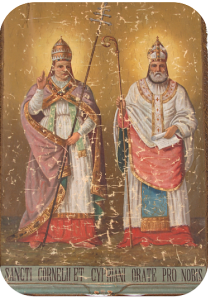Words on the Word
Sts Cornelius & Cyprian
Homily given at the beginning of a retreat for the clergy of the Prelature of Tromsø.
1 Timothy 3.1-13: Let him live a worthy life.
Luke 7.11-17: Young man, I command you: Rise!
Today we commemorate two holy bishops: Cornelius and Cyprian. We remember them not least for the common front they formed against a heresy that’s still alive and well today, anno 2025. In their day it was associated with the Novatian schism. The context for it was the persecution of Christians that had raged under the Emperor Decius. 
Not all Christians were heroes back then either. Some gave in to pressure and took part in rites reckoned as idolatrous. How was one to deal with such persons retrospectively?
Cornelius and Cyprian had high expectations. They presupposed years of penitential discipline. But they did maintain that a human being can, in a Christian perspective, make up for wickedness; and that God, the patient and endlessly merciful One, enables this to happen.
Novatian, by contrast, regarded a fall as final. The Church, in his view, was for the immaculate. Novatian’s standard was heroic, but terrible. It proclaimed: ‘Oh man, you’ve a single chance. If you miss it, you must manage on your own. No hand will be extended towards you.’
Such an attitude is not Catholic. That is what Cyprian and Cornelius established. The Catholic Church is not a fellowship made up of faultless paragons of virtue. The Church consists of fallible folk who know from experience what it is to fall — and to be raised up again; folk relieved of the illusion of their own perfection, who thereby have learnt to nurture hope for others, too.
For if God has shown me such kindness, why should he not likewise embrace my neighbour?
Our times are Novatian. They are prone to idealise, but also happy to see the downfall of idealised people. We gladly throw to the lions people who have let us down, or whose behaviour or mindset is distasteful to us. We like to form small, protected conventicles in which we fancy ourselves members of a select few — until, of course, we are chucked out ourselves and experience what it is like to err in the night, freezing, finding that no one opens when we ring their doorbells. 
Cornelius and Cyprian remind us that mercy is a crucial category of Christian, Catholic living. Mercy is not about taking things lightly, about shrugging our shoulders and saying, ‘Oh, it doesn’t matter’. Mercy is the divine quality that sees a life not just for what it is or has been, but for what it might become, and that lets God, the Almighty, loosen what is rigid, melt what is frozen, straighten what is crooked — even raise the dead.
Paul in his letter to Timothy shows us how this quality is realised in a specifically priestly life: by means of self-control, gentleness, hospitality, resistance to evil talk and diabolical snares.
Let us, then, called as we are to be fishers of men, live accordingly.
In the name of Christ! Amen.
